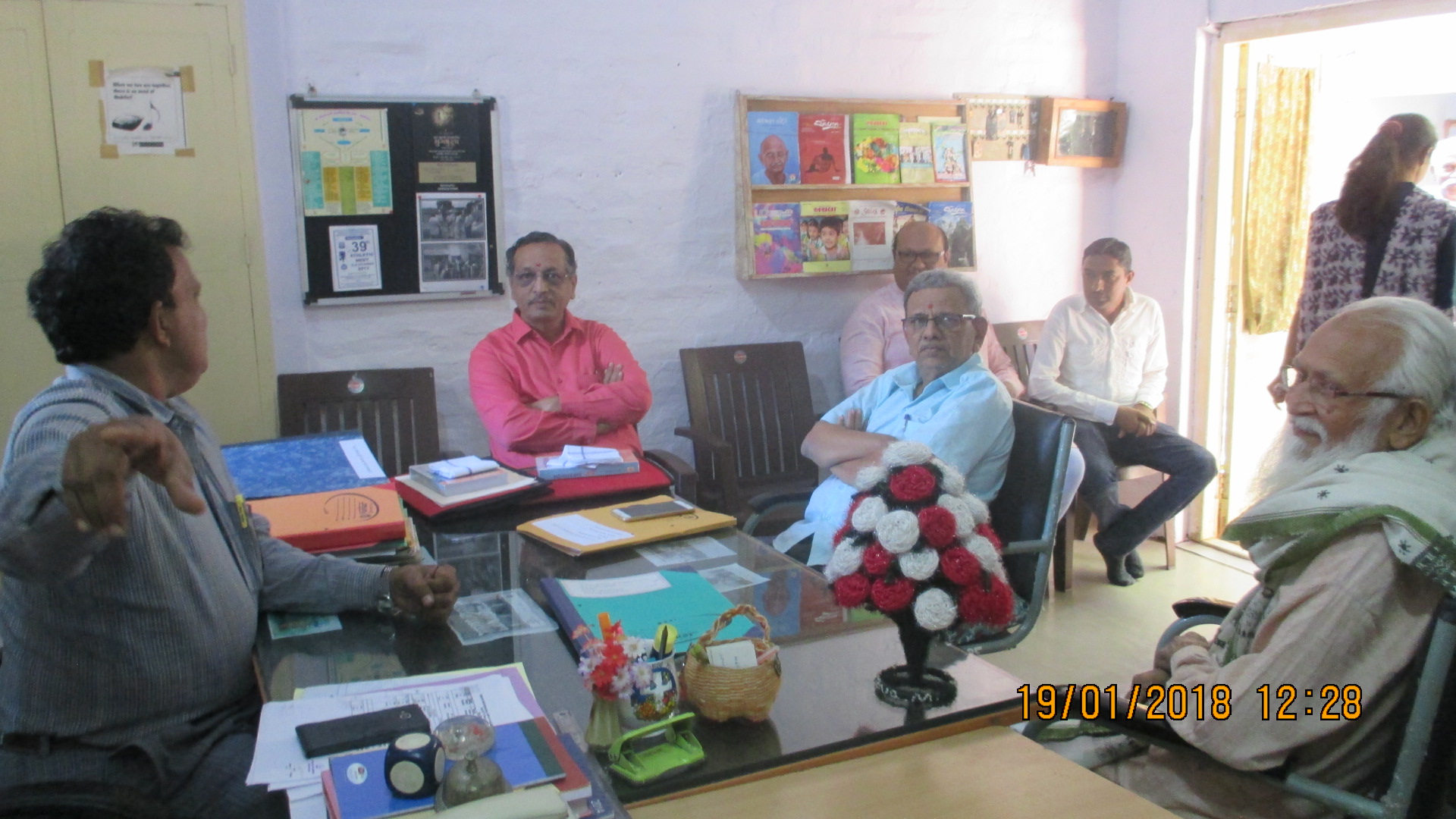હાલમાં આ બી.એડ. વિભાગ સ્થગિત છે.
Bachelor of Education-Basic (B.Ed.- Basic)
The untrained graduates, working as the teachers in post-basic secondary schools-lokshalas for many years, required to have training at the then available centers- Graduate Basic Training Center (GBTC)- of Mangrol, Rajpipala and Ahmedabad. These centers were started by the visionary Chief Minister of the bilingual Mumbai State Shri Balasaheb Kher in Maharashtra and Gujarat, for imparting the training to the teaching and administrative staff of Nai Taleem Adhyapan Mandir. The State Government of Gujarat administrated those centers and the Gujarat State examination Board had authority to conduct the examination and issuing certificates.
The founders of Lokbharti considered the importance of training of three responsible persons: farmers, Gram-sevak-the village secretary and teachers, for the rural-welfare constructive programmes. To meet this requirement, Snatak Nai Taleem Kendra (GBTC), a complete residential center, was started at Shetruji Dam site campus of Lokbharti in 1969.
This training center was shifted to Lokbharti, Sanosara in 1972. The center was recognized by the National Council for Teacher Education (NCTE) in 2000 and also got affiliation with the Maharaja Krishnakumarsinhji Bhavnagar University in 2006 as ordered by the Education Department of Gujarat Government. The center was named as Snatak Nai Taleem Mahavidyalaya. After the affiliation with the university, the trainees have been conferred the degree of B.Ed. (Basic). The admission process follows the rules and regulations laid by the University and NCTE. This one-year course after graduation offers teaching methods of Agriculture, Hindi, Gujarati, Science, Mathematics, English and some optional subjects. The course has been following the semester system since 2006-07 as directed by the U.G.C.
Sarvodaya, faith in Gandhian thoughts, socially useful productive labour, experience based training imparted through the mother tongue with co-relation and the likewise elements are considered as the means of bringing about social change in basic education. In this context the educational programmes are planned here as to fulfill the objective of preparing teachers-education officers and administrative officers of post basic primary education. Community life, domestic duties-self-dependence, physical labour, khadi, simplicity, co-education, etc. constitute the code of conduct in the same way as they are found in other educational sections of Lokbharti. Understanding and insistence for the use of Swadeshi and Gramodyoga things are clearly expected.
After the training, students have been found working devotionally, understanding the attitudes and needs of their students and the physical requirements of the school. They have been role-models of leadership in local level democracy and also performing special responsibilities efficiently if any assigned to them.
The UNESCO honoured this training course of Snatak Nai Taleem Mahavidyalayas as the work and activity-oriented teachers training, and one of them Snatak Nai Taleem Mahavidyalaya here has the following features:
- Efforts are made to impart the training for the understanding of original nature and interrelationship of the education, teacher, students and parents, so that they can justify their teaching profession in future.
- Character-building process is concretized through community life, domestic-duties, self-dependence, co-education, physical labour, khadi, simplicity, collective prayer, festival, cultural programme, songs-music, sports, students’ council, Lokbharti-orientation camp, service-oriented duties, ‘sarvodaypatra’ etc.
- Co-curricular programmes such as lectures, group discussions, self-study, subject-related field work/rural area visits, UGC sponsored seminars/workshops, guest lectures, village-placement, gramjivan sampark yatra, kindergarten camp, work-experience placement, educational tours/visits, film-shows, self-cooking-nature study camp, sky-gazing, etc. shape our the teaching and learning process variegated, interesting, live and fruitful.
- Socially useful productive physical labour, gardening, kitchen-garden, spinning yarn-camp, etc. beget the sense of respect and sensitivity towards the laborers. Skill strength development and the pride of labour are cultivated among the students by allotting them labour-work every year engaging them into various socially useful productive works.
- The training s/he receives here regarding cleanliness and beautification will be helpful to him/her making the school-campus attractive and beautiful in future.
- The trained teacher of this section can make the teaching-learning process interesting, easy and life-oriented with the appropriate application of TLMs (Teaching Learning Materials), acting songs, story telling, role-plays and various activities.
- Apart from the craft of spinning and agriculture, training of computer is compulsory.
- The education devoid of fear, prize-lure and competitions assists to achieve the balanced-development, attaining the mutual love, respect and co-operative service attitude.
- All curricular activities train students about the methods of teaching and learning, developing scientific vision and research attitude.
- Off-campus and in-campus activities devoted to the integrated education of Hand, Head and Heart, provide opportunities for the self-confidence and personality development.
- Use of modern educational technology (ICT enabled learning) creates enough scope to match up with the contemporary trends of Nation. Due emphasis is given to the study of English language and computer-internet-application as a part of their syllabus.
- Effort is made to spread awareness regarding the importance of education and school for democracy, socialism and secular Nation-building without having any discrimination.
- The teachers imparting training here are informed with the National and International trends of Education.
- Constant efforts are made to enliven the contacts with the parents and former students for suggestions and feedback.
The faculty-members are also provided opportunities and occasions to develop their efficiency-ability by allowing them to take part in useful off campus programmes. Freedom is given to the teachers to adopt various teaching methods and experiments in teaching.
Link for NCTE : www.ncte.gov.in


